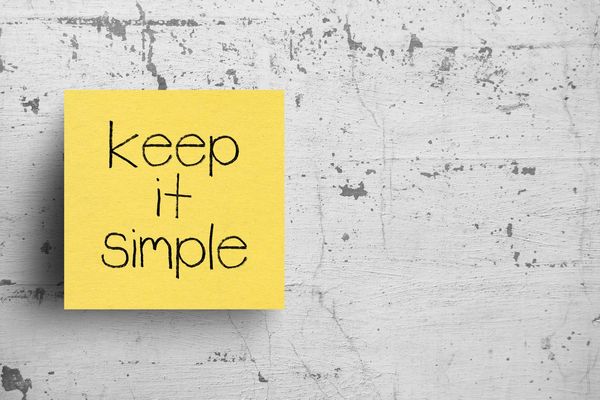For many people, going to a doctor's office for even a routine examination is enough to raise blood pressure and spike anxiety levels. Whether you are a physician or other professional, the moment you step foot in the exam room you suddenly feel powerless. And with such limited time spent with the physician, the clock starts ticking.
My solution for dealing with what will always be a vulnerable situation is to bring an advocate, or what I like to call a "health buddy."
Nobody, especially older adults, should try to navigate the system alone. Everyone should have a health buddy, someone who serves as an extra pair of eyes, ears and, perhaps, hands, taking notes about the visit.
A health buddy should go along not only for routine checkups and annual exams but can and should come for emergency room visits and hospital stays, too.
If you are a long-distance caregiver and can't serve as the health buddy advocate for your loved one, try to find a relative or good friend to step in for you. Anyone without family or close friends nearby should look for a volunteer health buddy through local support groups or religious organizations.
I dream of starting a volunteer health buddy service for older adults. Many retired adults would be willing to help an older adult prepare for an office visit and go with them into the exam room. Imagine the peace of mind you would have as a long-distance caregiver, knowing there was someone trusted and trained who could go with your loved one to each office visit. They could relay important information back to you as well, keeping you in the loop.
An office visit can be for an older adult can be challenging. An older adult may have more health problems and concerns that require discussion and action. They may take more medications prescribed by various health care professional. And they may have hearing or cognitive difficulties.
But most health care professionals don't add more time to the visit to accommodate the more complex health issues of older adults.
Think about it: The 5 to 15 minutes you have with your physician is where most major health decisions and prescriptions are generated.
These visits may occur infrequently, and, all too often, most people—even older adults—go alone into the exam room. It would be much better if you had someone there to keep you company while waiting for the health care professional, to make sure you voice your concerns during the visit, and to take notes.
A 2007 study of almost 400 videotaped office visits with older adults showed that the median length of the visit was 15 minutes. This encompassed a variety of practice types including academic medical centers where visits were usually longer. In the typical group practice, the time spent per visit was less.
According to the results of the taped interviews, both the patient and physician spoke for about 5 minutes each. The average number of topics discussed was 6.5. The researchers noted that one topic was considered "major" or the chief reason for the visit. The major topic discussion took about 2 minutes of time total. That means there was less than one minute of time for each of the other topics.
They found something else interesting. If the patient initiated the topic, the physician spent almost 20 percent more time on it. What better reminder: You or your health buddy needs to speak up to get your questions answered.
Read 10 Important Steps to Better Communication With Your Doctor.
When discussing their findings, the researchers concluded, "We couldn't help but wonder how much is accomplished during such a brief exchange." The truth is, not much. Yet the 15 minutes of face-to-face time you have with your health care professional is where most major health decisions are made and prescriptions are generated.
As I have talked about in prior blogs, scheduling an appointment solely for a medication or prescription checkup is essential for anyone taking multiple medications or who has medication concerns. Please read my prior post on why and how best to prepare for a medication check-up.
Today the total time spent in an office visit may be a few minutes more than years past, but the eye-to-eye contact is less thanks to the computer and the typing demands of the electronic health record. Most of us would rather talk to someone looking at us than someone facing a computer, rapidly taking notes.
Your Patient Power Is Left Behind
Our personal power—our ability to feel in control and take charge of our health and health choices—is perhaps the most important behavior that determines our ability to engage and get the best possible care.
Yet, the moment we step into the exam room and don the dreaded exam gown we often leave our personal power behind. Having a health buddy there with you can do a lot to restore your sense of power.
Prepare an Office Visit Agenda
You and your health buddy should prepare for your doctor's appointment by writing down important questions and concerns. With so little time available with your health care professional, you need to have clear and concise questions to ask at the start of the visit to set the agenda so it works best for you.
Speaking up isn't always easy, especially for older adults who have grown up with the idea that their doctor knows best. I remember one older patient I cared for who, when I asked her what was wrong, would always respond saying, "You tell me. You're the doctor."
This octogenarian thought I had magical powers and could guess just by looking at her what was wrong or what care was necessary. She wanted to believe I would know which of the many things wrong with her was important—that I would know best. I had patients who wouldn't point out a breast lump, for example, hoping that if I didn't find it on an exam, it might not be important.
The truth is, you know more about your health and what is worrying you than anyone. Speak up and share that information.
Dr. Benjamin Spock was so right when he wrote these words in the forward to his 1949 book on parenting: "Trust yourself. You know more than you think you do."
In truth, physicians need to take time during office visits to learn more about what truly matters to their patients. This takes time and isn't typically done during routine appointments. A health buddy can help start these important conversations. Remember:
You are the expert on you. You know what is on your mind and what questions and concerns you might have.
Before the visit, rehearse with your health buddy. By saying things out loud you can hear how your concerns sound and can get over your fear of voicing your concerns. During the visit, a health buddy can bring up topics the patient may be reluctant or embarrassed to ask about. The health buddy can also take notes on what the health care professional says.
A health buddy is indispensable after leaving the doctor's office, helping follow through on what the health care professional advises. Studies show that the average patient forgets half of what is said as soon as the appointment is over.
I was a health buddy for my sister recently when she had major back surgery. I went with her to doctor appointments and stayed with her in the hospital. My sister hated to speak up and be a squeaky wheel. She trusted that doctors knew best, and she didn't want to take up their valuable time. I spoke up on her behalf, provided important health information about my sister, and quickly spotted medication issues and other problems.
Have you been a health buddy for someone you care about? What has been your experience with a loved one? Do you know of someone who could use your help as a health buddy? Pay it forward, commit to being a health buddy for someone you care about today.
Marie Savard, MD, is a trusted voice on women's health, wellness and patient empowerment. She currently writes a blog called Ask Dr. Marie, where this column first appeared. Her blog focuses on the challenges of medication overload in older adults and what caregivers can do to help. Dr. Savard is a former ABC News Medical Contributor and author of four books including her most recent, Ask Dr Marie: What Women Must Know about Hormones, Libido, and the Medical Problems No One Talks About. She lives in Philadelphia with her physician husband and has three grown sons.







